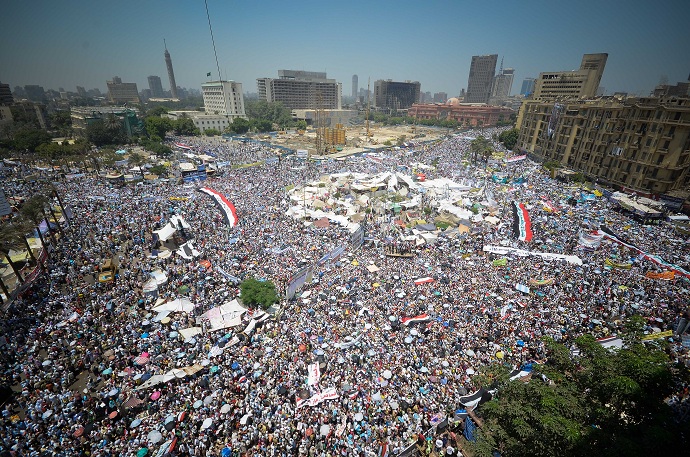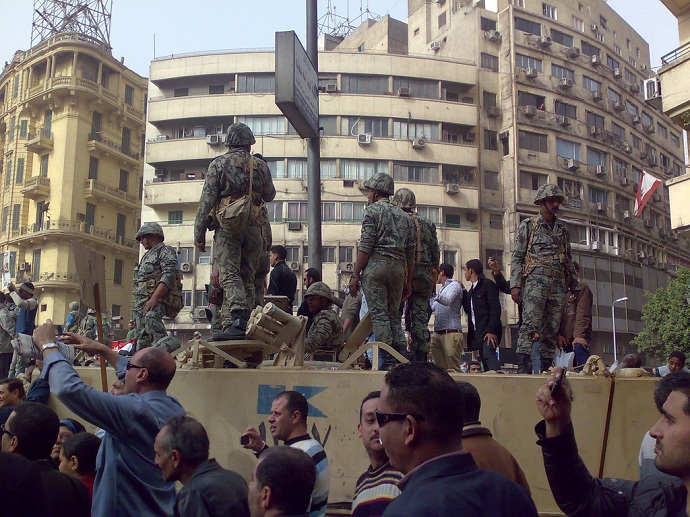We sat down with veteran journalist and Middle East expert Ashraf Khalil to discuss the history of the Egyptian Revolution, where it is now, and what the future holds for the most populous Arab nation in the world.
History Reader: It has been three years since protesters first gathered in Tahrir Square and the Egyptian Revolution began. Since then, Hosni Mubarak has been driven from power, the Muslim Brotherhood’s candidate, Mohamed Morsi, has come and gone. What’s next for Egypt?
Ashraf Khalil: What’s next is most likely an extended period of confusion and national anxiety paired with an overt retrenching of the old security state whose abuses and misbehavior were one of the primary reasons for the original 2011 revolution. The Old Guard is back and they are openly suppressing any sort of inconvenient or off-message political activity or criticism. Egypt is actively rolling back many of the gains of the original revolution—and most remarkably it is doing so with the support of wide swaths of the population.

Tahrir Square on July 29, 2011, as protesters gather during the Egyptian Revolution. Courtesy of Ahmed Abd El-Fatah via Wikimedia Commons.
HR: Tahrir Square translates to “Liberation” in English. Can you tell us about the importance of this square to popular movements throughout modern Egyptian history?
AK: Ironically Tahrir Square didn’t really have that much political significance prior to the revolution. For most of the Mubarak years, the hotbeds of political action were elsewhere—at university campuses or places like the Journalists Syndicate or Lawyers Syndicate. It was only in the revolution that Tahrir became this spontaneous seat of revolutionary and political power.
However since the revolution, Tahrir has become one of the country’s most important pieces of political, emotional, and psychological real estate. It’s a sort of political barometer: You can almost say that whoever controls Tahrir controls the country.
When Mohammed Morsi became president, his supporters packed the square and held it for months worth of Friday protests and rallies. Halfway through Morsi’s reign, the secular opponents of Morsi battled with the Muslim Brotherhood for control of Tahrir. As Morsi became more unpopular and embattled, his supporters decamped and set up shop around the presidential palace in late 2012–and from that point on, Tahrir was the center of the anti-Morsi movement.
Now Tahrir is firmly in the hands of the military and it’s very telling how hard they work to keep control of it and how hard the Muslim Brotherhood keeps trying to penetrate it. Whenever there’s a day of Brotherhood protests, the military simply shuts down Tahrir and prevents any of the marches from getting close. Ever since August 2013, the government has shut down the subway station underneath Tahrir Square—a massive and vital commuter hub—because they don’t want Brotherhood supporters to sneak in that way (flash-mob style) and rally in the square.

Soldiers stand in an Army truck in Tahrir Square during the Egyptian Revolution. Courtesy of Ramy Raoof via Wikimedia Commons.
HR: How has the military’s role in Egyptian society evolved since the rule of Anwar Sadat?
AK: As we’ve learned, I’m not sure that it really has evolved. Sadat’s reign helped entrench the military as an economic powerhouse behind the scenes, benefitting from a steady flow of American aid and involved in myriad business ventures. Those interests have to be protected. Under Sadat and Mubarak, the protections were implicit and didn’t need to be formalized or codified as long as there was a military man in charge of the government. After the revolution, we saw the military move quickly to enshrine those protections and immunities on paper. It’s worth noting that even in the 2012 constitution that was forced through by Mohammed Morsi, the military was given special status and control over its own budget. Those protections have continued in the new constitution and we can certainly expect they’ll continue if Abdel Fatah Al-Sisi does indeed become Egypt’s next president. The bottom line is that the Egyptian military has never had to answer to or open its budget books to a civilian and they have no intention of starting now.
HR: Egypt is the most populous Arab nation and has historically seen itself as a leader of the Arab world. How does the current internal turmoil affect this status?
AK: Unfortunately it affects Egypt’s status in a very negative way. Egyptians have long considered their country as the most influential state in the Middle East—and to a certain extent that is true. When Egypt stagnated politically and socially under Mubarak, the rest of the region stagnated as well. And when Egypt launched its revolution (in fairness inspired by Tunisia) it sparked a host of parallel movements around the region.
But that’s all gone now. Egypt is a basket case, entirely propped up by foreign aid—much of it from repressive Gulf monarchies. Right now Egypt is leading by negative example. I know for a fact that the major political players in Tunisia are openly looking at Egypt as an example of what NOT to do and actively working to avoid the same fate.
HR: For many years, the Muslim Brotherhood was banned by the Egyptian government. Could you talk about the history of the Brotherhood and give us any insight into what’s next for them in Egypt?
AK: The Brotherhood has proven to be an absolutely brilliant and effective outsider opposition force and a complete disaster in power. The behavior of the Brotherhood since the revolution—and particularly during Morsi’s year in power—did catastrophic damage to the Brotherhood’s reputation and “brand.” Other opposition groups came to the conclusion that they simply could never trust or work with the Brotherhood. And even worse than seeming devious and power-hungry, they seemed chaotic and clueless. I remember a veteran socialist politician telling me just before Morsi was ousted that, “I always knew we couldn’t trust them. But I at least expected them to be competent!”
Part of this can certainly be traced to the Brotherhood’s history. They have always been outsiders, always persecuted and marginalized. That bred a stubbornness and a siege mentality that proved to be disastrous when they actually secured the reigns of power.
Was Mohammed Morsi conspired against as president? Yes absolutely. But those conspiracies could not possible have worked if the Muslim Brotherhood hadn’t alienated so much of the country and so many of their potential allies and political partners.
What’s next is a return to the marginalized political fringes where the group has proven most comfortable. But this is not a return to the same sort of outsider status that the Brotherhood is used to. They have never been this unpopular on a grassroots level. They still retain a loyal and passionate base of support. But outside of that base, they are absolutely hated by the Egyptian people and that is something the Brotherhood has never experienced before.
ASHRAF KHALIL has covered the Middle East and the Egyptian Revolution for Time, The Economist, The Times (London), Foreign Policy, the San Francisco Chronicle, The Christian Science Monitor, and the Middle East edition of Rolling Stone. He worked as a correspondent for the Los Angeles Times in the Baghdad and Jerusalem bureaus and has been based in Cairo for most of the last fifteen years. His latest book is Liberation Square: Inside the Egyptian Revolution and the Rebirth of a Nation.
